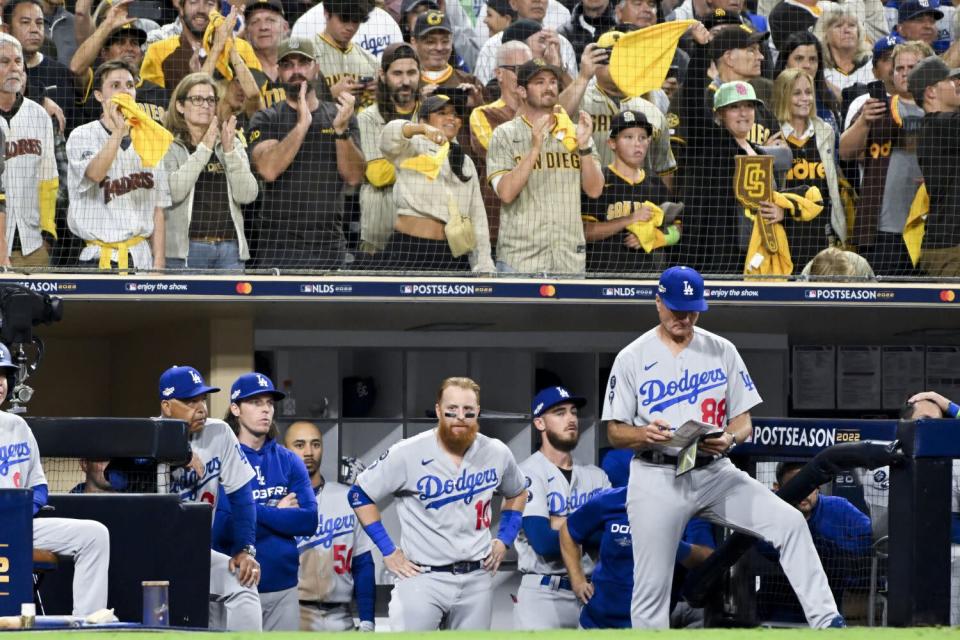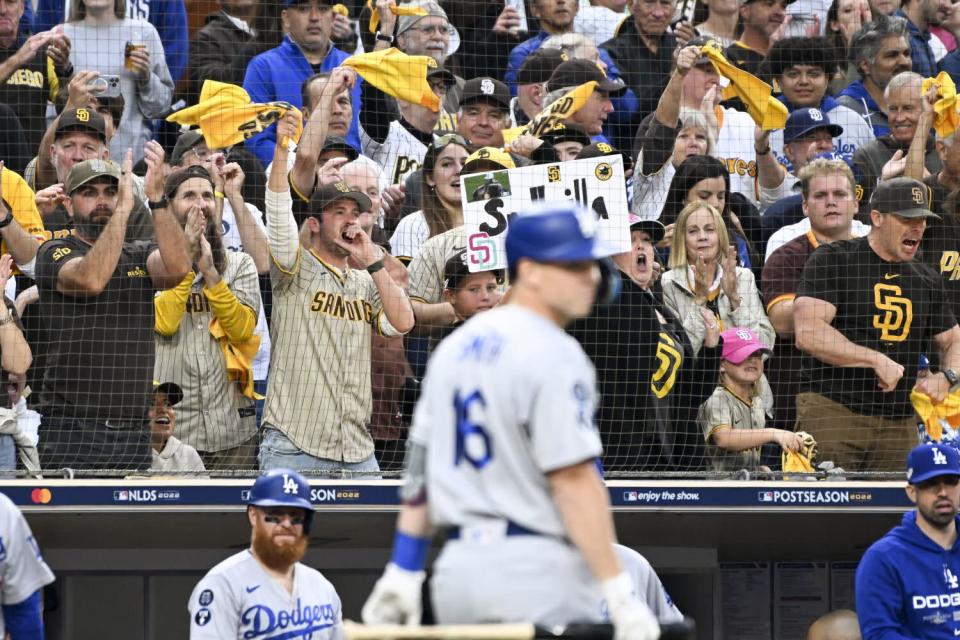It’s unimaginable. It’s unthinkable. It could never happen.
It’s nine innings from happening.
Barely a week after ending a regular season full of 111-win life, the Dodgers are suddenly on their last breath.
After six months of complete baseball domination, the Dodgers are on the verge of losing it all in four nights.
The best team in Dodger history could soon become the most disappointing team in Dodger history.
On a night when constant chants of “Beat L.A.” rang their ears and thousands of flapping yellow towels filled their eyes, the stunned Dodgers stumbled into what could be yet another nightmare to their latest dream.
Facing a renewed San Diego Padres team at a rejoicing Petco Park Friday, the seemingly hapless and helpless Dodgers lost 2-1 to fall behind two games to one in the best-of-five National League Division Series.
If they lose Saturday night here in Game 4, they’re toast. If they win Saturday and lose Sunday at Dodger Stadium in a deciding Game 5, they’re toast. Either way, they’re one game away from the unlikeliest of eliminations.
“Yeah, it’s where we’re at,” said manager Dave Roberts. “It was a very good regular season, but as we said before, none of that matters … the team that plays the best baseball is going to win the series. And up to this point, they’ve played better than we have.”
The winner of Game 3 of a five-game series that was tied one-game apiece has won the series 72% of the time, so it’s not looking good. In fact, with the Dodgers facing a must-win game in this frenzied environment, it’s looking seriously bad.
“It’s win or go home,” said Roberts. “We’ve got to play better baseball.”
The Padres won this game as they won Game 2, with timely hitting and tremendous pitching. The Dodgers lost as they lost in Game 2, with horrendous hitting and shaky pitching.


The Padres and Blake Snell took a 2-0 lead against Tony Gonsolin and Andrew Heaney, then held on with their fabulous bullpen shutting down the Dodgers once again.
Twelve Dodger batters faced the Padres relievers, and only Trea Turner could manage to reach base, and only on an infield single. The Dodgers are now scoreless in 13 innings against a Padres bullpen that during the regular season did not rank among the game’s elite.
“I’m not shocked at all,” said the Dodgers’ Mookie Betts, who has only two hits in this series. “They’re a good ball team. They’re playing well and we haven’t.”
Not shocked? At all? He’s the only one. Only three teams in baseball history had won more regular-season games than these Dodgers. They had the highest run differential since the 1939 New York Yankees. Not only are they the championship favorites, but at times this year they seemed unbeatable.
And now they’re on the verge of losing a series to a team that finished 22 games behind them in the standings?
“We’re still in it, we’ve got tomorrow, we’ve got a game tomorrow, it’s not over,” said Freddie Freeman, who stranded three of the Dodgers seven runners left on base amid an offense that went hitless in nine at-bats with runners in scoring position.
He’s right. It’s not over. The Dodgers could, and probably should, sweep through the next two games and move on to the National League Championship Series.
But still, that sort of comeback was increasingly difficult to imagine as this game appropriately ended with the Dodgers failing to even get the ball out of the infield against Padres closer Josh Hader.
Foul out, strikeout, strikeout, Hader pounds his fist against his glove and a stadium erupts.
And guess what? Game 4 on Saturday night here will feature yet another pitching matchup that appears to favor San Diego.
The Padres will throw Joe Musgrove, who pitched seven one-hit shutout innings against the New York Mets last week in the deciding game of the wild-card series.


The Dodgers will counter with Tyler Anderson, who was 15-5 with a 2.57 ERA this season but has just one career postseason start.
“We’ve got our hands full,” said Roberts.
The Padres and their city were ready for this one. The Dodgers were not.
It was the Padres’ first playoff game in front of home fans in 16 years, and, for perhaps the first time in those 16 years, that home was not overtaken by Dodgers fans. Also for one of the first times, the Dodgers seemed shaken by the surroundings.
The fans chanted “Beat L.A.” two hours before the game, two minutes before the game, and seemingly every two seconds after that.
Sometimes they chanted to the pounding of a drum. Other times they chanted to the grinding of an organ. But always they chanted, the frustration of 16 years of being overshadowed by their giant neighbors erupting in passion that kept the cooling night hot.
[embedded content]
They also waved yellow towels from beginning to end, standing and flapping and turning the quaint ballyard into an angry sweeping flame.
“It was a pretty good atmosphere to play in, they had a big say in what went on today too,” said Padres’ manager Bob Melvin of the fans. “It felt like the last couple innings there was so much momentum in the place that it was hard not to get it done.”
The Padres and their fans indeed did everything they could to disrupt the Dodgers, including even attempting to goose them.
Yes, after a goose landed in Dodger Stadium right field Wednesday and momentarily disrupted the game, the Padres viewed it as a good omen and showed up Friday night with two ceramic geese in their dugout. Meanwhile, outside the stadium, someone painted a mural with a giant goose entitled “San Diegoose.”
Don’t laugh. It worked.
The Dodgers briefly quieted the crowd just three pitches into the game, when Betts grounded a single up the middle against Snell. But Trea Turner followed with a strikeout and, after Betts reached second on Snell’s wild pitch, Freeman and Will Smith also struck out. It was an ugly sign of things to come.
“We’re just not doing it right now,” said Betts.
Meanwhile, the Padres scored first, in the first, which only turned up the crowd’s volume. With one out against Gonsolin, Juan Soto doubled into the right-field gap, then Manny Machado walked. One out later, on a two-strike full-count pitch, Jake Cronenworth lined a single to center to score Soto.
Gonsolin wouldn’t even last another full inning, lifted in the second with runners on first and third and having thrown 42 mostly lousy pitches.
Remember, Gonsolin had pitched just once since Aug. 23 and is still recovering from a forearm injury. He also had a 9.45 ERA in seven career postseason appearances.
Roberts replaced him with Heaney, who was sidelined with shoulder pain for half of the season and struggled to find himself once he came back. Those struggles reappeared on the first pitch of the fourth inning, Trent Grisham driving a Heaney fastball into the right-field stands for a home run and a 2-0 lead and all they needed.
Right about now, are you thinking what many are thinking? It’s amazing that a 111-win team would have to rely on a patchwork pitching plan in the third game of the postseason.
This is what happens when your ace blows out his elbow and you don’t replace him with another starting pitcher at the trade deadline. By not accounting for the loss of Walker Buehler, the Dodgers might have lost this game, and their season, back in July.
For the record, in case you couldn’t see it through all the waving yellow towels, a wild Trayce Thompson swing and miss ended this game.
But the nightmare could be just beginning.
This story originally appeared in Los Angeles Times.
